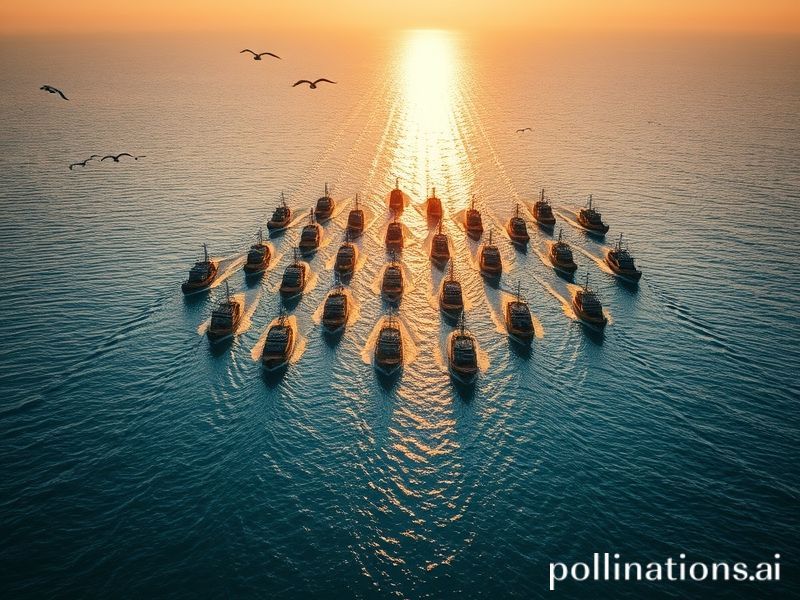Flotilla Fiascos: How a Bunch of Boats Became the World’s Favorite Floating Flashpoint
Flotilla: Humanity’s Favorite Way to Turn a Leisurely Sail into a Geopolitical Flashpoint
By Dave’s Locker International Desk
Let us begin with a calming image: a gentle breeze, cerulean water, the faint clink of rigging against aluminum masts—peaceful, almost poetic. Now add a destroyer, a coast guard cutter, a livestream drone, three competing hashtags, and the unshakable suspicion that someone, somewhere, is already drafting a UN resolution. Congratulations, you now have a flotilla: the nautical equivalent of a family picnic that somehow ends with tear gas, viral footage, and a hastily scheduled emergency summit.
From the Bosporus to the Taiwan Strait, flotillas have become the maritime Swiss Army knife of modern statecraft: part humanitarian gesture, part psy-ops, part floating press conference. Pack a few aid boxes on deck and you’re a saint; pack too many and you’re a blockade runner. The difference is measured less in tonnage than in whose naval intelligence is doing the measuring. Last year, a Spanish NGO’s six-boat mercy mission to Gaza was hailed by half of Twitter as “the second coming of Dunkirk” and condemned by the other half as “a flotilla-shaped Trojan horse.” Both sides agreed on one thing: the sandwiches were stale.
The word itself—flotilla—conjures a quaint, diminutive innocence. It sounds like a small basket of pastries, not a potential casus belli. Yet size is relative. To the Philippines, a 200-boat civilian “fishing” swarm near Thitu Reef is a plucky act of patriotic resistance. To China, it’s an invasive species requiring a coast-guard exterminator. Swap the flags, rinse, repeat, and you have the same scene playing out in the Aegean, the Black Sea, and lately the English Channel, where inflatable dinghies have achieved the diplomatic punch of dreadnoughts at a fraction of the price.
Historians trace the modern flotilla’s pedigree to the 1970s “Peace Fleet” that tried to block French nuclear tests in the Pacific—an escapade that ended when a commando team politely wrecked the flagship’s hull and the world’s press collectively shrugged. Since then, technological advances have ensured that every rubber raft now carries a satellite uplink, ensuring that any confrontation can be live-tweeted before the coast guard has finished its morning coffee. This has transformed the flotilla from tactical nuisance to full-service content generator—complete with dramatic music, slow-motion replays, and the inevitable GoFundMe for legal fees.
Environmentalists, not to be outdone, have weaponized the concept for the planet. Greenpeace’s latest “Ocean Defense Flotilla” shadowed an oil rig across the Arctic like a flock of judgmental seagulls, trailing banners in six languages and a carbon footprint their accountants valiantly try to offset. Meanwhile, in the Gulf of Guinea, piracy has gone artisanal: small flotillas of ex-fishermen armed with AK-47s and Bluetooth speakers now board tankers to the beat of Afrobeats, proving that even maritime crime wants a curated soundtrack.
The economic implications ripple outward like diesel on water. Insurance premiums for any vessel passing a “likely flotilla corridor” have spiked 19 percent this year, according to Lloyd’s of London, which classifies such zones with the same euphemistic cheer it once reserved for “iceberg-prone latitudes.” Container shipping giants now reroute around entire seas to avoid the reputational risk of appearing on camera next to a protest yacht named “Sea You in Court.” The added mileage, of course, is quietly billed to consumers who never realized their morning coffee now circumnavigates Sri Lanka because someone spray-painted “Free Whales” on a catamaran.
And yet, for all the saber-rattling and hashtag warfare, flotillas persist because they serve the one constituency that never changes: the human craving for narrative. They are floating morality plays with clear protagonists (plucky volunteers), obvious villains (whoever’s navy is biggest), and a plot twist no one admits: every party secretly loves the drama. Governments get to look tough, NGOs get donations, media gets footage, and the rest of us get another reminder that the line between conscience and clickbait is thinner than a carbon-fiber hull.
So the next time you see a headline about a “civilian flotilla bound for troubled waters,” remember: somewhere on that azure horizon, international law, public relations, and basic physics are about to collide. Pack sunscreen, a VPN, and perhaps a life vest. The sea was always indifferent, but now it’s trending.







